Books by Azul T. Katz
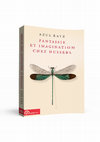
Zeta Books, 2023
D’où proviennent les nymphes, les centaures et autres créatures merveilleuses ? Comment est-il po... more D’où proviennent les nymphes, les centaures et autres créatures merveilleuses ? Comment est-il possible d’imaginer des mondes fictifs, idéaux ou simplement différents du nôtre ? Qu’est-ce que la fantaisie ? Sous le nom du « paradoxe des représentations sans objets existants », ces questions se situent aux origines mêmes de la phénoménologie, et bien qu’à première vue elles semblent constituer un sujet marginal chez Husserl, elles traversent toute son œuvre et conduisent à des analyses aussi précises qu’éclairantes, mais cependant complexes. Le présent ouvrage vise précisément à donner un aperçu de la genèse et de l’évolution du concept d’imagination libre ou simple fantaisie dans la pensée du fondateur de la phénoménologie. En distinguant ce vécu de ceux de la perception, du souvenir, de l’illusion sensible, de l’hallucination et du rêve, il est possible de découvrir, d’abord, son caractère éminemment productif. Enfin, on examinera les fonctions que la fantaisie productrice accomplit dans les domaines qui lui sont généralement associés, comme celui de la création artistique et de l’expérience esthétique, par exemple, mais bien au-delà également, comme dans ceux de l’empathie, la conception des possibilités, l’intuition d’idéalités, la pensée hypothétique et l’action politique, entre autres. En effet, la fantaisie ne se réduit pas au seul pouvoir de nous emporter au-delà des horizons connus : c’est la constitution même de notre propre monde qui a besoin de sa liberté.
Workshops & Conferences by Azul T. Katz
Conferencia y Seminario "La tematización fenomenológica de la fantasía" A. Katz en la BUAP-2024, 2024
Conferencia y seminario en la BUAP - México
Intervention au séminaire 2023-2024 du Groupe de recherche et d’analyse des phénoménologies (GRAP... more Intervention au séminaire 2023-2024 du Groupe de recherche et d’analyse des phénoménologies (GRAPH)
Organisation : Chiara Pesaresi (UCLy) / Pierre-Jean Renaudie (Lyon 3/IRPHIL
Mardi 12 décembre 2023, 18:30 hs
Sorbonne, Salle Cavaillès
Azul Katz, "Entre l'impossible et l'ir... more Mardi 12 décembre 2023, 18:30 hs
Sorbonne, Salle Cavaillès
Azul Katz, "Entre l'impossible et l'irréel: imagination et fantaisie chez Husserl et au-delà"

Full CfA: https://execo.hypotheses.org/11689
Imagination is a highly problematic concept. On t... more Full CfA: https://execo.hypotheses.org/11689
Imagination is a highly problematic concept. On the one hand, it seems to stand in opposition to reality by making itself synonymous with dreams or madness. On the other hand, in the contemporary context of virtual realities, the media and new artistic orientations, the distinction between imagination and reality is constantly being called into question. Therefore, in aesthetics, politics and epistemology, imagination does not seem to be truly opposed to reality. It is here that a phenomenological analysis of imagination - as found in Husserl, Conrad-Martius, Sartre, Ricoeur and Ingarden, among others - as well as of the phenomena that result from it, and of the particular attitude in which we find ourselves when we imagine, makes it possible to account for the interweaving of imagination and reality on the basis of a re-qualification of the experience of subjectivity.
We invite doctoral students and young researchers who would like to take part in the Workshop "L'imagination en phénoménologie" to submit proposals for papers dealing with the imagination from a gnoseological, aesthetic and/or political perspective, which may either fit into a specific phenomenological orientation, or discuss the phenomenological tradition by opening it up to a dialogue with other philosophical methods and traditions. All presentations will be given in French and will not exceed 30 minutes.
The event organizers will not provide funding for presenters, but letters of invitation and certificates of participation will be sent to participants.
Interested parties can send a title and 800-word abstract by October 27 to the following e-mail address:
imagination.phenomenologie2023@gmail.com

VII 31st – VIII 4th – 2023 – XIX Congress of the International Association of Women in Philosophy (IAPH), 2023
Since its beginning, phenomenology as a philosophical school has the peculiarity of having been f... more Since its beginning, phenomenology as a philosophical school has the peculiarity of having been formed by a strong feminine presence. From the first and direct students of Husserl in the circle of Göttingen onwards, women in phenomenology have developed fundamental, avant-garde and innovative perspectives. However, their intellectual destiny, their discussion, diffusion and subsequent reception, was not equivalent to that of their male peers. From Edith Stein to Simone de Beauvoir, from Conrad-Marthius to Maria Zambrano, women phenomenologists have elaborated unique and invaluable material, but not always recognized in the framework of international dialogue, neither within nor outside the phenomenological school.
Women philosophers who have also developed the task of commentators, translators or philologists have followed a similar fate: with a work equivalent to that of many of their male colleagues, figures such as Julia Iribarne, Natalie Depraz or Sara Heinämaa also embody a constant and rigorous task of teaching and conceptual development that does not always find an equivalent or sufficient diffusion.
Faced with this tendency, lasting more than a century, in this symposium we will try to shed light on some of these figures, to make them known, to discuss and criticize them, from the perspective of phenomenologists who, already part of a generational change, offer new ways of thinking about the phenomenological school and its possibilities.
The symposium is organized in two main axes: one interdisciplinary on the crossroads of phenomenology and other disciplines, and the other on the fundamental concepts of phenomenology. Anyone who wishes to submit proposals for papers on women authors in the phenomenological tradition is invited to do so. Priority will be given to lesser-known women authors, but proposals for papers on classic subjects developed by women philosophers linked to the phenomenological tradition will also be considered.
Presentations:
1. Constitución y persona, ¿qué modificación?, Mariana Larison, CONICET-UBA-UNGS.
2. Hannah Arendt y su fenomenología de la pluralidad: de Kant a Husserl, Azul T. Katz, CONICET-UBA-UNGS.
3. Sara Paín y Françoise Dolto: hacia una fenomenología del sostén, Jésica Buffone, CONICET – LICH /UNSAM.
4. La fenomenología ontológica de Hedwig Conrad-Martius. Una figura olvidada del cisma fenomenológico, Celia Cabrera, CONICET/Academia Nacional de Ciencias de Buenos Aires.
5. Maternidad y alienación. Un diálogo entre Lucía Piossek Prebisch e Iris Marion Young, Verónica Kretschel, CONICET — UBA.
6. El problema de la empatía en Edith Stein: apuntes para una bioética del dolor, Ivana Sánchez, UNGS-UBA.
7. La feminidad como estilo: Sara Heinämaa sobre Simone de Beauvoir, María Celeste Vecino, Universidad Diego Portales.
8.“El artista actor como potencia inventiva en la fenomenología del teatro de Adelina Castex” Marianela Calleja (UNS-UNISAL-CIF); Alejandro Marquínez (UBA-CIF).
9. “Narrar el cuerpo en la experiencia de la enfermedad: S. de Beauvoir en diálogo con Merleau-Ponty” Mónica Ogando (UBA).
Our next session will take place this Saturday at 17:30 (CEST) / 10:30 (Peru). In this session, w... more Our next session will take place this Saturday at 17:30 (CEST) / 10:30 (Peru). In this session, we will enjoy the talks of Smaranda Aldea (Kent State University), Azul Katz (Universidad de Buenos Aires), Rodrigo Y. Sandoval (Centro de Estudios Mediales - UAH), and Federico Fantelli (University of Palermo / University of Fribourg) followed by an open discussion.
Please use the following access information:
Link: https://zoom.us/j/95141664612?pwd=MGNIYk5jOGZybklZL3pUc0ZsVTFMUT09
ID: 951 4166 4612
Password: 140061
Papers by Azul T. Katz
Ideas y valores, 2024
The paper seeks to extend Husserl’s analyses of phantasy, developed through contrast with other e... more The paper seeks to extend Husserl’s analyses of phantasy, developed through contrast with other experiences as perception, image-consciousness and memory, which resul-ted in a characterization of phantasy as a kind of intuitive, direct, and non-positional re-presentation. An extension of these analyses with the study of the functions that phantasy fulfills in the intuition of essences, the conception of possibilities, em-pathy, the reconstruction of history, aesthetic contemplation, and artistic creation, will show the quasi-productive feature that essentially characterizes phantasy acts.

Tópicos, Revista de Filosofía, 2023
This paper seeks to restore the questions that led Husserl to capture the morphological essence o... more This paper seeks to restore the questions that led Husserl to capture the morphological essence of phantasy and its modalities and to fix each of its essential features. Despite the early stabilization of the definition of phantasy as a type of intuitive, simple and non-positional presentification, the literature on the subject is still opaque regarding the way in which this type of experience is constituted in internal consciousness and in relation to the criteria that allow to distinguish it from other more or less close phenomena, such as perception, memory, image-consciousness or imagination, among others. Establishing the genesis and evolution of this concept will enable not only to clarify these opacities, but also to shed light on those other spheres of experience in which phantasy plays a substantial role, such as the intuition of essences, empathy, or aesthetic contemplation.
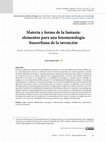
Escritos, 2022
Se busca establecer las condiciones de posibilidad de la invención a través del análisis de los d... more Se busca establecer las condiciones de posibilidad de la invención a través del análisis de los distintos modelos con los cuales Husserl da cuenta de la constitución de las vivencias intencionales. En el primer apartado, se analiza el modelo hilemórfico perceptivo o esquema aprehensión-contenido de aprehensión que explica la constitución de la experiencia nueva en sentido originario. En el segundo apartado, se muestra cómo Husserl inicialmente desentraña la estructura de la imaginación y la posibilidad de sumergirse en mundos ficticios exhibidos en imágenes con una variación del modelo perceptivo, al cual denominamos hilemorfismo analógico. Sin embargo, al profundizar en el análisis de la conciencia de imagen, se revela que la posibilidad de inventar mundos ficticios depende de otro tipo de vivencia, la libre fantasía, que, por su parte, se resiste a ser explicada con una variación del esquema forma-contenido porque puede obrar sin ninguna base sensible. Ello conduce a presentar, en el tercer apartado, el modelo de la modificación reproductiva, desarrollado por Husserl en respuesta a las paradojas que surgen de aplicar el esquema hilemórfico a presentificaciones como la fantasía y la rememoración. Sin embargo, dado que una variación del modelo reproductivo tampoco alcanza para dar genuina cuenta del carácter productivo de la fantasía, por último, la cuarta sección define la invención como el exceso de sentido que introducen los actos de fantasía de acuerdo con tres condiciones: la autoneutralización del curso de vivencias; una duplicación de la conciencia; y la asociación no habitual de intenciones parciales en una configuración fantaseada.
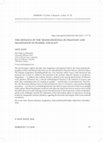
Horizon. Studies in Phenomenology, 2018
The present paper explores the place that imagination and phantasy hold in the transcendental phi... more The present paper explores the place that imagination and phantasy hold in the transcendental philosophies of Kant and Husserl when they are not subordinated to functions that are external to them. The Kantian imagination (Einbildungskraft) has a key function within reason, both theoretical and practical, but it seems to exhibit its true potential in the aesthetic subjective domain, as productive imagination — in addition, this aesthetic domain is defined as the most properly human. In Husserl’s work, phantasy (Phantasie) has a relevant methodological function in the intuition of essences and plays other constituting roles, for example in empathy — and therefore in intersubjectivity. Nevertheless, the Husserlian phantasy shows its full potential not when it is bound to a presentation through perception — as it does in its constituting functions, but when it is pure and moves freely in an enlarged eidetic sphere. Husserlian phantasy would not only allow the transit from facts to essences, but it would also allow the reverse path, limiting essences towards facticity. In this framework, a final consideration points to the challenges raised by the exploration of this intermediate sphere of experiences involving productive imagination and pure phantasy, regarding the hierarchy and margins of the transcendental constitution.

Tópicos, 2021
Husserl progressively analyzes phantasy as opposed to the originality of perception —whose consti... more Husserl progressively analyzes phantasy as opposed to the originality of perception —whose constitutive model is the apprehension of present contents, from the mediateness of image–consciousness— as species of indirect representation, and from the positing of memory —which requires the development of a reproductive modification model. The analysis by contrast with other intentional experiences leads to characterizing phantasy as an inactual kind of reproductive modification or, more precisely, as “the neutrality modification of the ‘positing’ re–presentation” (Ideas I, § 111). Nevertheless, it may be objected that defining phantasy as a kind of indeterminate memory restricts its creative and free possibilities. Therefore, to account for a more adequate definition, the analysis must extend beyond the fundamental question of whether to believe or not to believe, and affirm both phantasy’s inactuality and quasi–productivity.

Areté
¿Cómo entender la contradicción de una filosofía que, a la vez que se autoproclama heredera legít... more ¿Cómo entender la contradicción de una filosofía que, a la vez que se autoproclama heredera legítima de la fenomenología, pretende liberarse de sus límites y abrir paso a la manifestación incondicionada? ¿Debemos sin más leer la obra de Jean-Luc Marion como una verdadera renovación de la fenomenología, tal como él y sus seguidores pretenden o, por el contrario, debemos leerla como pura teología independizada del movimiento fenomenológico? ¿Por qué sería la vía teológica la única salida posible de la crisis de la metafísica contemporánea denunciada por Marion y, más aún, una vía necesaria? Para responder a estas y otras preguntas, el presente trabajo desarrolla algunas de las paradojas que surgen del giro teológico marioniano, distinguiendo dos maneras posibles de entender su 'Kehre': o bien como una desviación que permite extender la fenomenología a nuevos campos, o bien como un regreso o vuelta atrás y abandono del proyecto fenomenológico. Por último, nos preguntamos si la ontología donadora gradual, propuesta por Marion, no permite pensar en una posible tercera vía, según la cual el pensamiento de Marion no sería ya una fenomenología, sino una fansiología teológico gradualista.
While it is true that Husserl did not write systematically about aesthetics, it is not only possi... more While it is true that Husserl did not write systematically about aesthetics, it is not only possible and legitimate but also necessary to inquire how a Husserlian aesthetic consciousness could be understood. A closer consideration of the aesthetics that can be gleaned from the passages in which Husserl explicitly refers to artistic experiences shows a limitation of the aesthetic field to figurative art. To widen and enrich the aesthetic field beyond the experiences that such an aesthetics would account for, a shift of perspective is required. But to allow this change without leaving Husserl's phenomenology, I consider in this article the outcome of analyzing this field of experiences from phantasy's perspective instead of that of image consciousness.
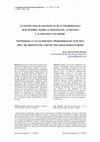
Investigaciones Fenomenológicas
Si bien es cierto que Husserl no ha escrito sistemáticamente sobre estética, consideramos no sólo... more Si bien es cierto que Husserl no ha escrito sistemáticamente sobre estética, consideramos no sólo posible y legítimo, sino también establecer las condiciones de posibilidad para una conciencia estética desde el punto de vista de la fenomenología trascendental de Husserl. Motivados por esta idea, en el presente trabajo examinamos, en primer lugar, el tipo de estética que puede deducirse de aquellos pasajes en los que Husserl considera explícitamente experiencias artísticas, para arribar a la idea de que, analizado desde la perspectiva de la conciencia de imagen, el fenómeno estético del que se puede dar cuenta es limitado. Así, en segundo lugar, intentamos mostrar que esta pobreza no es esencial al fenómeno y, por tanto, que dichas limitaciones pueden ser superadas, o al menos trascendidas, si en vez de considerar la estética desde el punto de vista de la conciencia de imagen, se la considera desde la perspectiva de la fantasía.While it is true that Husserl has not written systematic...
Edited Journals by Azul T. Katz
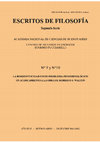
Escritos de Filosofía - Segunda serie, 2022
Con los números 9 y 10 de Escritos de Filosofía–Segunda serie, los antiguos discípulos de Roberto... more Con los números 9 y 10 de Escritos de Filosofía–Segunda serie, los antiguos discípulos de Roberto Walton han querido dedicar al maestro un número donde se expone y se discute su obra. Han reunido para ello más de veinte trabajos consagrados a una pluralidad de aspectos del pensamiento de Walton, que incluye no solamente a la fenomenología husserliana sino también al diálogo abierto y fructífero con sus herejías, iluminando de este modo un horizonte filosófico multifacético y de singular profundidad. Las contribuciones incluidas en estos dos volúmenes cumplen así con un doble propósito: el merecido homenaje a la enjundia filosófica de Roberto Walton, y una ratificación del espíritu inaugural de Escritos: la confianza en la capacidad de la razón y en la eficacia de una crítica constructiva.
Nº 9: https://plarci.org/index.php/escritos/issue/view/129
Nº 10: https://plarci.org/index.php/escritos/issue/view/130
Schriften zur Phänomenologie und Anthropologie, 2022
This book confronts a topic largely neglected in research on phantasy: the relationship between ... more This book confronts a topic largely neglected in research on phantasy: the relationship between fictional events and the emotions of the subject having a phantasy experience. What is the nature of an emotional response to fiction? Are emotions indifferent to the existence of what causes them? How do fictional emotions relate to their real counterparts? The volume gathers ten innovative essays tackling these questions from a phenomenological perspective.
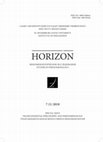
Horizon. Studies in Phenomenology, 7.1. (2018), 2018
Журнал входит в международные базы данных, электронные библиотеки открытого доступа, каталоги пер... more Журнал входит в международные базы данных, электронные библиотеки открытого доступа, каталоги периодических изданий: Scopus | DOAJ | The Philosopher's Index | CrossRef | ERIH plus | ProQuest | CEEOL | J-Gate | Ulrich | WorldCat | Google Scholar | CyberLeninka | RISC | MLA International Bibliography | OAJI | COPE Журнал зарегистрирован в качестве СМИ. Свидетельство ПИ № ФС77-54878 от 26 июля 2013 г. Учредители журнала: Санкт-Петербургский государственный университет и Артеменко Наталья Андреевна Журнал издается при Институте философии Санкт-Петербургского государственного университета и при участии Центрального европейского института философии при Карловом университете и Институте философии Чешской академии наук ПУБЛИКУЕМЫЕ МАТЕРИАЛЫ ПРОШЛИ ПРОЦЕДУРУ РЕЦЕНЗИРОВАНИЯ И ЭКСПЕРТНОГО ОТБОРА Главный редактор Наталья Артёменко (Россия) Санкт-Петербургский государственный университет Учёный секретарь Татьяна Балакирева (Россия) Санкт-Петербургский государственный университет Редакционная коллегия Ханс-Райнер Зепп (Германия, Чехия) Педагогический университет Фрайбруга и Карлов Университет в Праге; Карел Новотны (Чехия) Институт философии Чешской академии наук; Александр Шнелль (Франция) Университет Париж IV Сорбонна; Андрей Паткуль (Россия) Санкт-Петербургский государственный университет; Георгий Чернавин (Россия) Национальный исследовательский университет "Высшая школа экономики", Москва; Андрей Лаврухин (Россия) Национальный исследовательский университет "Высшая школа экономики", Санкт-Петербург; Фёдор Станжевский (Россия) Санкт-Петербургский государственный технологический институт (Технологический университет); Михаил Белоусов (Россия) Российская Академия Народного Хозяйства и Государственной Службы при Президенте Российской Федерации, Москва; Олег Мухутдинов (Россия) Уральский государственный университет, Екатеринбург; Фредерик Трэмблей (Россия) Балтийский федеральный университет имени Иммануила Канта, Калининград; Алексей Крюков (Россия) Социологический институт Российской академии наук, Санкт-Петербург; Светлана Никонова (Россия) Санкт-Петербургский Гуманитарный университет профсоюзов Научный совет Дан Захави (Дания) Университет Копенгагена; Николя Фернандо де Варрен (Бельгия) Католический университет Лувена; Ханс-Хельмут Гандер (Германия) Фрайбургский университет им. Альберта-Людвига; Михаэль Габель (Германия) Университет Эрфурта; Жан Гронден (Канада) Университет Монреаля; Себастиан Луфт (США) Университет Маркетт; Дитер Ломар (Германия) Университет Кёльна, директор Гуссерль-архива; Виктор Молчанов (Россия) Российский Государственный гуманитарный университет; Неля Мотрошилова (Россия) Институт философии Российской Академии Наук; Алексей Савин (Россия) Институт философии Российской Академии Наук; Ярослав Слинин (Россия) Санкт-Петербургский государственный университет; Александр Хаардт (Германия) Рурский университет Бохума; Петер Травни (Германия) Бергский университет Вупперталя; Эндрю Хаас (Россия, США) Национальный исследовательский университет "Высшая школа экономики" (Москва); Михаил Хорьков (Россия) Институт философии Российской Академии Наук; Наталья Бросова (Россия) Белгородский государственный национальный исследовательский университет; Данил Разеев (Россия) Санкт-Петербургский государственный университет; Аннабель Дюфурк (Франция, Нидерланды) Университет Неймегена имени св. Радбода Утрехтского; Юлия Орлова † (Россия) Санкт-Петербургский государственный университет; Роман Громов † (Россия) Южный Федеральный университет; Ласло Тенгели † (Германия) Бергский университет Вупперталя Электронная почта гл. редактора: n.a.artemenko@gmail.com © СПбГУ, 2018 Информация о журнале размещена на сайте: www.horizon.spb.ru HORIZON STUDIES IN PHENOMENOLOGY Vol. 7 (1) 2018 SPECIAL ISSUE TRANSCENDENTAL PHILOSOPHY AND PHENOMENOLOGY The journal is indexed in: Scopus | DOAJ | The Philosopher's Index | CrossRef | ERIH plus | ProQuest | CEEOL | J-Gate | Ulrich | WorldCat | Google Scholar | CyberLeninka | RISC | MLA International Bibliography | OAJI | COPE Mass media registration certificate ПИ № ФС 77-54878 issued on
Uploads
Books by Azul T. Katz
Workshops & Conferences by Azul T. Katz
Organisation : Chiara Pesaresi (UCLy) / Pierre-Jean Renaudie (Lyon 3/IRPHIL
Sorbonne, Salle Cavaillès
Azul Katz, "Entre l'impossible et l'irréel: imagination et fantaisie chez Husserl et au-delà"
Imagination is a highly problematic concept. On the one hand, it seems to stand in opposition to reality by making itself synonymous with dreams or madness. On the other hand, in the contemporary context of virtual realities, the media and new artistic orientations, the distinction between imagination and reality is constantly being called into question. Therefore, in aesthetics, politics and epistemology, imagination does not seem to be truly opposed to reality. It is here that a phenomenological analysis of imagination - as found in Husserl, Conrad-Martius, Sartre, Ricoeur and Ingarden, among others - as well as of the phenomena that result from it, and of the particular attitude in which we find ourselves when we imagine, makes it possible to account for the interweaving of imagination and reality on the basis of a re-qualification of the experience of subjectivity.
We invite doctoral students and young researchers who would like to take part in the Workshop "L'imagination en phénoménologie" to submit proposals for papers dealing with the imagination from a gnoseological, aesthetic and/or political perspective, which may either fit into a specific phenomenological orientation, or discuss the phenomenological tradition by opening it up to a dialogue with other philosophical methods and traditions. All presentations will be given in French and will not exceed 30 minutes.
The event organizers will not provide funding for presenters, but letters of invitation and certificates of participation will be sent to participants.
Interested parties can send a title and 800-word abstract by October 27 to the following e-mail address:
imagination.phenomenologie2023@gmail.com
Women philosophers who have also developed the task of commentators, translators or philologists have followed a similar fate: with a work equivalent to that of many of their male colleagues, figures such as Julia Iribarne, Natalie Depraz or Sara Heinämaa also embody a constant and rigorous task of teaching and conceptual development that does not always find an equivalent or sufficient diffusion.
Faced with this tendency, lasting more than a century, in this symposium we will try to shed light on some of these figures, to make them known, to discuss and criticize them, from the perspective of phenomenologists who, already part of a generational change, offer new ways of thinking about the phenomenological school and its possibilities.
The symposium is organized in two main axes: one interdisciplinary on the crossroads of phenomenology and other disciplines, and the other on the fundamental concepts of phenomenology. Anyone who wishes to submit proposals for papers on women authors in the phenomenological tradition is invited to do so. Priority will be given to lesser-known women authors, but proposals for papers on classic subjects developed by women philosophers linked to the phenomenological tradition will also be considered.
Presentations:
1. Constitución y persona, ¿qué modificación?, Mariana Larison, CONICET-UBA-UNGS.
2. Hannah Arendt y su fenomenología de la pluralidad: de Kant a Husserl, Azul T. Katz, CONICET-UBA-UNGS.
3. Sara Paín y Françoise Dolto: hacia una fenomenología del sostén, Jésica Buffone, CONICET – LICH /UNSAM.
4. La fenomenología ontológica de Hedwig Conrad-Martius. Una figura olvidada del cisma fenomenológico, Celia Cabrera, CONICET/Academia Nacional de Ciencias de Buenos Aires.
5. Maternidad y alienación. Un diálogo entre Lucía Piossek Prebisch e Iris Marion Young, Verónica Kretschel, CONICET — UBA.
6. El problema de la empatía en Edith Stein: apuntes para una bioética del dolor, Ivana Sánchez, UNGS-UBA.
7. La feminidad como estilo: Sara Heinämaa sobre Simone de Beauvoir, María Celeste Vecino, Universidad Diego Portales.
8.“El artista actor como potencia inventiva en la fenomenología del teatro de Adelina Castex” Marianela Calleja (UNS-UNISAL-CIF); Alejandro Marquínez (UBA-CIF).
9. “Narrar el cuerpo en la experiencia de la enfermedad: S. de Beauvoir en diálogo con Merleau-Ponty” Mónica Ogando (UBA).
Please use the following access information:
Link: https://zoom.us/j/95141664612?pwd=MGNIYk5jOGZybklZL3pUc0ZsVTFMUT09
ID: 951 4166 4612
Password: 140061
Papers by Azul T. Katz
Edited Journals by Azul T. Katz
Nº 9: https://plarci.org/index.php/escritos/issue/view/129
Nº 10: https://plarci.org/index.php/escritos/issue/view/130
Organisation : Chiara Pesaresi (UCLy) / Pierre-Jean Renaudie (Lyon 3/IRPHIL
Sorbonne, Salle Cavaillès
Azul Katz, "Entre l'impossible et l'irréel: imagination et fantaisie chez Husserl et au-delà"
Imagination is a highly problematic concept. On the one hand, it seems to stand in opposition to reality by making itself synonymous with dreams or madness. On the other hand, in the contemporary context of virtual realities, the media and new artistic orientations, the distinction between imagination and reality is constantly being called into question. Therefore, in aesthetics, politics and epistemology, imagination does not seem to be truly opposed to reality. It is here that a phenomenological analysis of imagination - as found in Husserl, Conrad-Martius, Sartre, Ricoeur and Ingarden, among others - as well as of the phenomena that result from it, and of the particular attitude in which we find ourselves when we imagine, makes it possible to account for the interweaving of imagination and reality on the basis of a re-qualification of the experience of subjectivity.
We invite doctoral students and young researchers who would like to take part in the Workshop "L'imagination en phénoménologie" to submit proposals for papers dealing with the imagination from a gnoseological, aesthetic and/or political perspective, which may either fit into a specific phenomenological orientation, or discuss the phenomenological tradition by opening it up to a dialogue with other philosophical methods and traditions. All presentations will be given in French and will not exceed 30 minutes.
The event organizers will not provide funding for presenters, but letters of invitation and certificates of participation will be sent to participants.
Interested parties can send a title and 800-word abstract by October 27 to the following e-mail address:
imagination.phenomenologie2023@gmail.com
Women philosophers who have also developed the task of commentators, translators or philologists have followed a similar fate: with a work equivalent to that of many of their male colleagues, figures such as Julia Iribarne, Natalie Depraz or Sara Heinämaa also embody a constant and rigorous task of teaching and conceptual development that does not always find an equivalent or sufficient diffusion.
Faced with this tendency, lasting more than a century, in this symposium we will try to shed light on some of these figures, to make them known, to discuss and criticize them, from the perspective of phenomenologists who, already part of a generational change, offer new ways of thinking about the phenomenological school and its possibilities.
The symposium is organized in two main axes: one interdisciplinary on the crossroads of phenomenology and other disciplines, and the other on the fundamental concepts of phenomenology. Anyone who wishes to submit proposals for papers on women authors in the phenomenological tradition is invited to do so. Priority will be given to lesser-known women authors, but proposals for papers on classic subjects developed by women philosophers linked to the phenomenological tradition will also be considered.
Presentations:
1. Constitución y persona, ¿qué modificación?, Mariana Larison, CONICET-UBA-UNGS.
2. Hannah Arendt y su fenomenología de la pluralidad: de Kant a Husserl, Azul T. Katz, CONICET-UBA-UNGS.
3. Sara Paín y Françoise Dolto: hacia una fenomenología del sostén, Jésica Buffone, CONICET – LICH /UNSAM.
4. La fenomenología ontológica de Hedwig Conrad-Martius. Una figura olvidada del cisma fenomenológico, Celia Cabrera, CONICET/Academia Nacional de Ciencias de Buenos Aires.
5. Maternidad y alienación. Un diálogo entre Lucía Piossek Prebisch e Iris Marion Young, Verónica Kretschel, CONICET — UBA.
6. El problema de la empatía en Edith Stein: apuntes para una bioética del dolor, Ivana Sánchez, UNGS-UBA.
7. La feminidad como estilo: Sara Heinämaa sobre Simone de Beauvoir, María Celeste Vecino, Universidad Diego Portales.
8.“El artista actor como potencia inventiva en la fenomenología del teatro de Adelina Castex” Marianela Calleja (UNS-UNISAL-CIF); Alejandro Marquínez (UBA-CIF).
9. “Narrar el cuerpo en la experiencia de la enfermedad: S. de Beauvoir en diálogo con Merleau-Ponty” Mónica Ogando (UBA).
Please use the following access information:
Link: https://zoom.us/j/95141664612?pwd=MGNIYk5jOGZybklZL3pUc0ZsVTFMUT09
ID: 951 4166 4612
Password: 140061
Nº 9: https://plarci.org/index.php/escritos/issue/view/129
Nº 10: https://plarci.org/index.php/escritos/issue/view/130